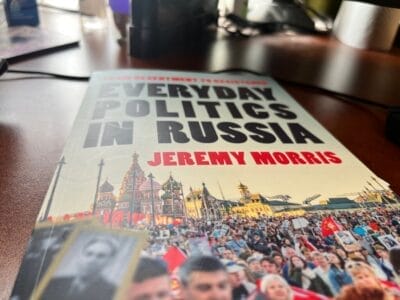
By John Mulhall @authormulhall | john@authormulhall.com is a writer with Irish Tech News for over 8 years and also a Cloud Engineer, Writer, and Novelist. You can learn more about John, and his debut novel “From Terror to Valor: Echoes and Shadows” on his author site at https://authormulhall.com
Everyday Politics In Russia Reviewed
After reviewing ‘Everyday Politics in Russia’ by Jeremy Morris, I feel more informed about the human condition, which lies beneath authoritarian Russia. For those who are in, or who have an interest in political science, sociology or geopolitics, this is a must-read about what lies beneath Putin’s Russia.
A point of note about the writing style. The author has a complex writing style and is not afraid to use industry terms in his explanations and arguments. A glossary of terms would expand the attraction to more general-interest readers aware of Russia as an authoritarian threat.
Three short stories at the introduction’s start greeted my entry into the book’s introduction. The author’s real-life extracts are composite examples of many conversations he had while there. They are also reference points throughout the book as they represent the human stories of ordinary Russians.
Given the author’s extended presence in Russia, finding extensive explanation and context for the book’s content was unsurprising. He concisely sets out the context of the read, setting expectations as he moves through the introduction. This book is a political anthology. In short, it’s a social behavior story about ordinary Russians.
As interpretation is part of the author’s premise in the book, he offers many opinions based on known facts and consistently held observations. He wishes to show the great conflict between Russia’s welfare message to its people and the harsh environment the state delivers in contradiction. Micro politics, cottage industries and informal work arrangements are part of the author’s exploration.
I found the reasons offered for pro-war and anti-war activism to be a stark reminder of what happens when the ordinary person gets left behind, only to become a commodity in a nation’s elitist agenda. The cross section of ordinary Russians drawn from in the author’s research, leans into this point as he moves into Part one.
Chapter one starts with Russia’s defensive consolidation in the face of humiliating defeats in Ukraine. Chapters two and three explore the roots of Russian resentment in the author’s view, along with the weaponization of the humiliation felt when the Soviet Union ended in 1991. The humiliation aspect has little to do with facts about the West. Yet, it was instrumental as a weaponized false narrative in convincing Russians of the threat posed by the West.
Chapter four begins part two in the exploration of hopelessness, along with the ideological clash between coercive state control and state welfare. It also looks at the consequences of this disparity, such as thriving underground industries and hushed political views. Chapter five finished out part two with an exploration of the ordinary Russian’s interaction with a militarized state, the coercive effect of state policing and how it clashes with welfare pledges.
Chapter six begins part three, where the author discusses micro-political climates of all kinds. It follows ordinary Russian interaction, growing the mutual aid concept, and reciprocity among ordinary Russians. This underground movement comes at the cost of state control and modernization.
Chapter seven explores adaptation by ordinary Russian households, turning to self-production, and salvaging what they can in harsh conditions to get by. Chapter eight switches gears to political activism, and the stark differences in the methodologies of pro-war and anti-war activism in Russia.
Chapter nine is the book’s conclusion, where the heavily researched content throughout is recast in summary. It draws supporting arguments from the content to make concluding points. Areas covered include the ordinary Russian’s relationship with the state, its security apparatus, along with state corruption versus systemic incoherence.
I found it to be a hefty read for sure, but worth the effort. The author’s target audience is primarily political science related, but other interested parties looking for a ‘behind the scenes’ view of ordinary Russians should check it out. Once you read the introduction carefully, noting the omissions, writing techniques used, and determinations setting context, the read will inform in depth, as it will in breadth, about everyday life in Putin’s Russia.
By John Mulhall @authormulhall | john@authormulhall.com is a writer with Irish Tech News for over 8 years and also a Cloud Engineer, Writer, and Novelist. You can learn more about John, and his debut novel “From Terror to Valor: Echoes and Shadows” on his author site at https://authormulhall.com
See more stories by John here, and breaking stories on Irish Tech News here, and more book reviews here.
